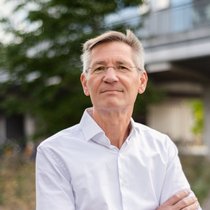On July 11, 2023, AMS Institute and the Municipality of Amsterdam hosted an event focusing on matchmaking opportunities for multifunctional quay walls. The event was attended by representatives from knowledge institutes, municipal departments, and utility companies.
Supply, demand, and coupling possibilities
The meeting started with an introduction by Ivo Visser (Municipality of Amsterdam). He discussed the value of pairing supply and demand and the early identification of needs from both sides. Visser continued by explaining the importance of life-extending measures as opposed to large-scale renovation or replacement.
Laura Hakvoort (Municipality of Amsterdam) complemented this discussion with a presentation on the coupling possibilities of bridges and quay walls. A new evaluation framework that promotes renovation and life extension perfectly supports this perspective. Hakvoort highlighted (future) challenges such as increasing logistics, waste management, urban transport, climate adaptation, and circularity. To address these challenges, she proposed focusing on coupling opportunities and risk prioritization with attention to livability, climate, biodiversity, and ownership, with safety as the highest priority.
Iterative research approach
Henk Wolfert, presenting on behalf of himself and Gerben Mol (both AMS Institute), shed light on action research into multifunctional quay walls. Wolfert and Mol observed that municipalities often operate from a short-term perspective, driven by risks and events in the city, while research offers a long-term perspective that can accommodate various city interests and possibilities.
“The 'problem' around bridges and quay walls isn't just about a lack of maintenance, but also a lack of knowledge. Thus, technical knowledge transfer to the city is essential.”
Henk Wolfert
Program Developer
Wolfert proposed an iterative approach of designing, testing, and redesigning, which aligns with the research through design principle. This approach allows researchers to learn while designing.
Perspectives from the city
The day also saw diverse perspectives from stakeholders such as Waternet (water quality and drinking water infrastructure), Liander (safety and replacement of the gas and electricity network), and Natuur Inclusief (biodiversity). Participants discussed the need to shift from function-oriented to area-oriented thinking. This shift is necessary to understand the value that a system or change brings, along with its associated risks.
Then, the groups split up for two rounds of workshops about topics such as energy and quay constructions, circularity, climate adaptation and biodiversity, and research through design.
New insights
The event concluded with a group discussion of new insights, underlining the need for continued communication and alignment of interests. The organizers announced an academic follow-up session in September to delve deeper into these discussions and explore the first versions of work package descriptions.
